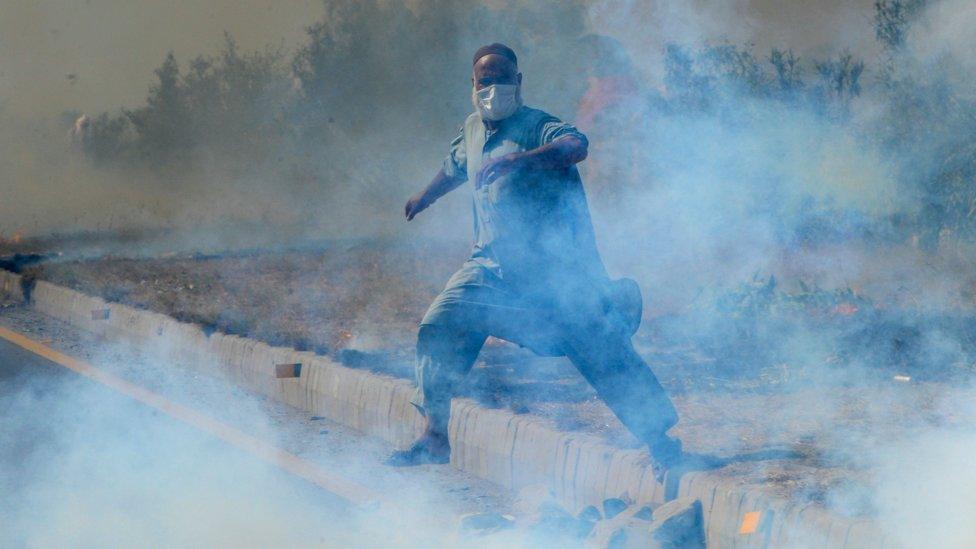The end of the affair: How Imran Khan went from the Pakistan Army’s saviour to its nemesis
- Published
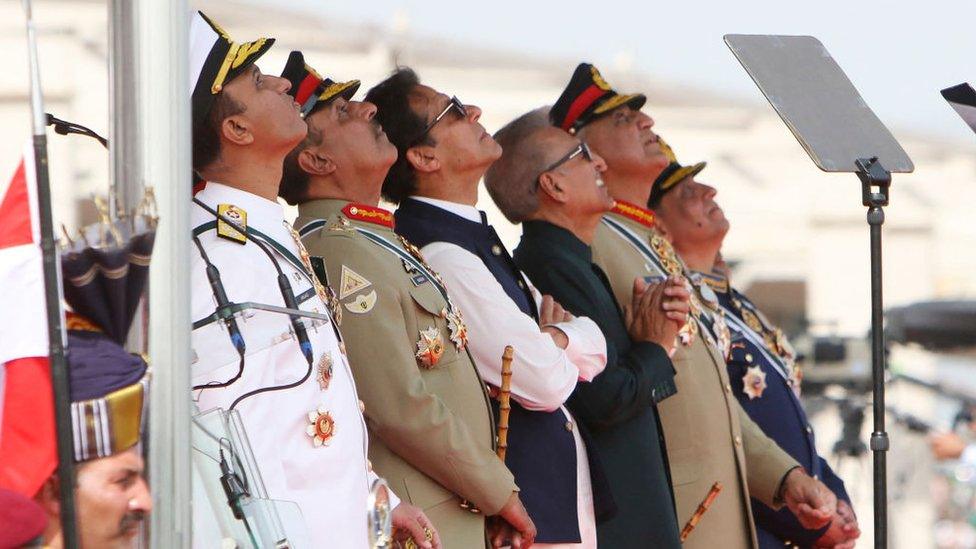
Then-Prime Minister Imran Khan and President Arif Alvi watch Pakistan's Air Force fighter jets perform during the Pakistan Day parade in 2022
For many years, Pakistan's military establishment believed that in Imran Khan they had found a saviour for the country. But, writes author and journalist Mohammed Hanif, after only a year out of power he is threatening to become their nemesis - and the military is using all its might to save itself from Khan's wrath.
As Imran Khan and his party face a country-wide crackdown, Pakistan seems to have come to a standstill.
The nation is facing crippling inflation and the hottest summer in history, with constant power breakdowns, and yet the whole country is consumed with what Khan will do next, and what our military establishment can do to contain him.
After he was removed from power more than a year ago, his supporters said Khan was their "red line" and that if he was arrested, the country would burn. After a number of failed attempts, a contingent of paramilitary forces did just that on 9 May.
The country didn't quite burn, but Khan's supporters took the fight to military cantonments.
The army's headquarters, General Headquarters (GHQ), probably the most secure place in Pakistan, was breached and people trampled on the signboards with military logos.
A senior general's house in Lahore was ransacked - Khan's supporters videoed themselves while setting his furniture and cars on fire. One protester walked away wearing the general's uniform, another made away with his pet peacock.
Watch: Imran Khan's arrest saga... in under 90 seconds
It had all the symbols of a revolution, except that it wasn't. Imran Khan was first loved by the army, then shunned by them, now his supporters were settling their scores. It was less of a revolution and more of a lovers' spat.
It's almost a rite of passage for every prime minister to fall out with the Pakistan army.
The country's first elected Prime Minister, Zulfikar Ali Bhutto, was hanged, his daughter Benazir Bhutto was dismissed twice as a prime minister and her assassination, by a teenage suicide bomber, was never fully investigated. Nawaz Sharif was dismissed, jailed, exiled - now again in exile, he rules by proxy via his younger brother Shehbaz, but still can't return to the country.
After Imran Khan's arrest his supporters did what no mainstream political force has done before. Instead of taking to the streets in protest, they invaded the cantonment areas and showed the citizens how Pakistani generals live: in huge mansions with swimming pools and acres of lawns where peacocks roam.
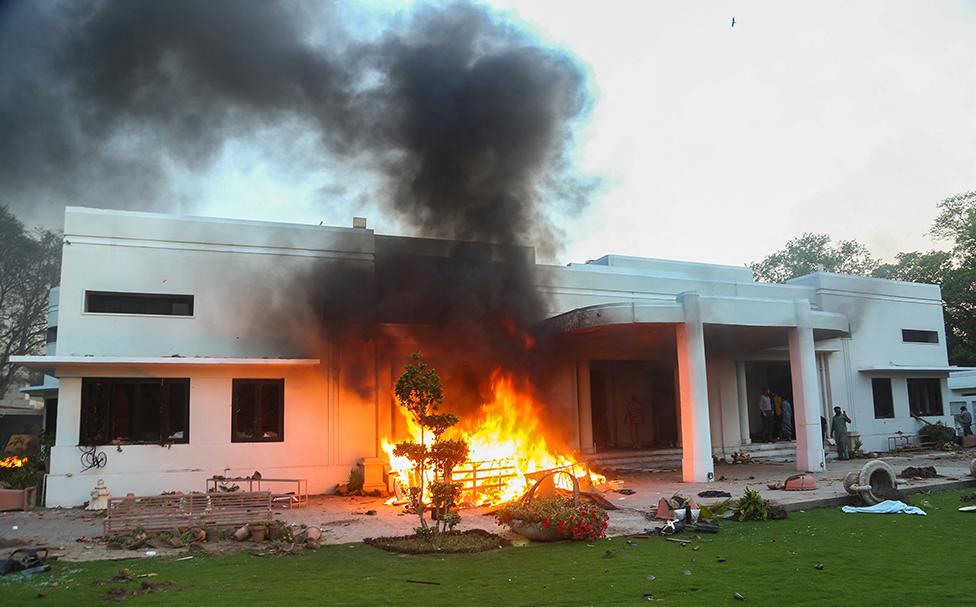
A house in cantonment area in Lahore which was set on fire on 9 May
Just before he was picked up, Khan singled out Pakistan Army's chief of staff General Asim Munir as the man trying to crush his political party.
Before that he had called the former army chief General Bajwa, who was instrumental in bringing and sustaining him in power, a traitor. He also named an ISI general for being responsible for a failed assassination on him. He and his supporters repeatedly called the accused general Dirty Harry in public rallies.
Many Pakistani politicians in the past have named and shamed the army as an institution but Pakistanis are not used to seeing the images of a Corps Commander's house on fire, women protesters rattling the gates of GHQ, and the statues of decorated soldiers being toppled.
This was exactly what the current government, a coalition of almost all the political parties opposed to Khan, needed to hit back.
The government has been trying to get out of an impending national election, which according to many opinion polls Khan is likely to win. Now many government politicians are calling for an outright ban on his party, Pakistan Tehreek-e-Insaf (PTI) - its name means Movement for Justice.
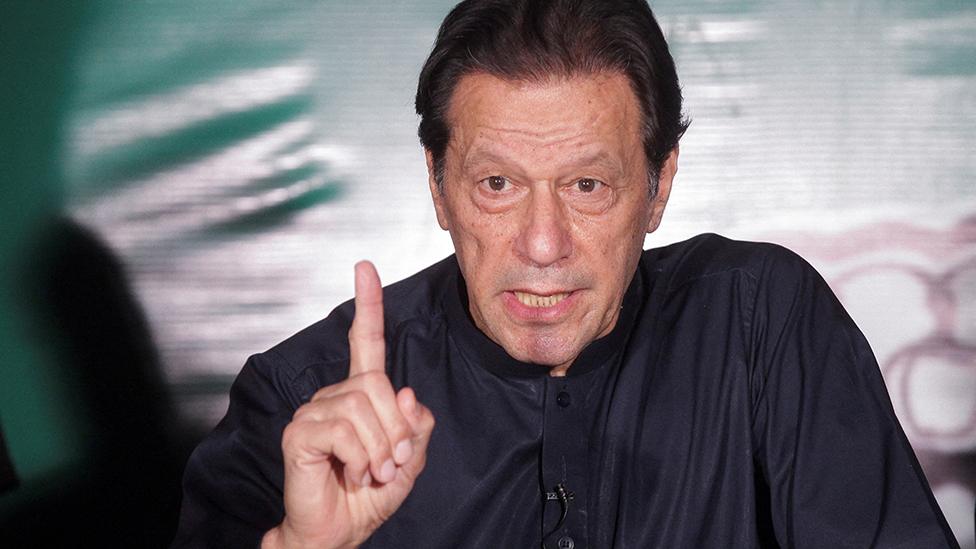
Imran Khan addressing the media from his home in Lahore last week
In the past, reprisals against politicians who have taken on the army have been swift.
Ali Wazir, an elected assembly member who called out the army's sympathies for the Taliban, was in jail for two years and was not even allowed to attend the National Assembly. Thousands of political workers from Balochistan have been forcibly disappeared and no Pakistani court or mainstream political party is interested in their plight.
So how come Imran Khan, despite facing dozens of charges, is still roaming free?
The perception is that he has polarised the establishment itself. There are officers and their families within the army who are enamoured by him. There is the judiciary which has been extending his bail. After spending one day in a lock-up, Pakistan's highest judge called him to court, said "happy to see you", and put him in a state guest house. The next day another judge released him.
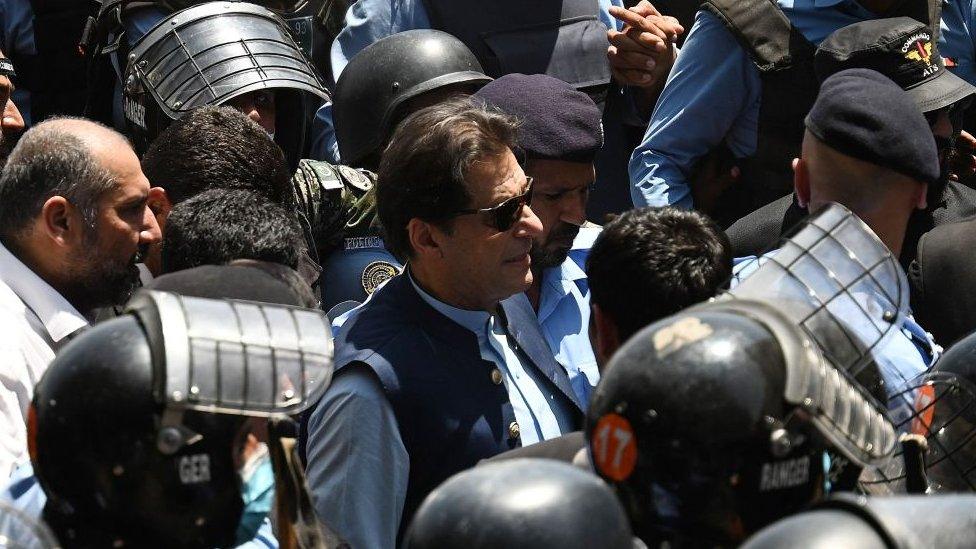
Police commandos escort former Pakistan's Prime Minister Imran Khan as he arrives at the high court in Islamabad
Imran Khan has won over a massive constituency in Pakistan that abhorred politics and politicians before he came along. His message of clean governance and justice has popular appeal - although when Khan was in power corruption actually increased and he put many of his political opponents in jail.
But his removal from power has emboldened his supporters, many of whom are women and young people who have never voted before and never attended a political rally.
They are often accused of political naivety, taking an ahistorical view of the current crisis and claiming that what is happening now has never happened in the history of Pakistan. They consider themselves part of a reformist movement that wants to rid the country of all corrupt politicians.
Like Khan, they once loved the army. Now they hold the army responsible for everything.
Despite Khan's repeated attacks on the army leadership, many believe that he doesn't really want to curtail the army's powers, he just wants the generals to love and support him and his party like they did before.
But in the aftermath of the riots on 9 May, the army high command seems to think that enough is enough. The current army chief has called it a "black day in the history of Pakistan".
Imran Khan might have ushered in a new kind of populist politics in Pakistan, but the army is using the same playbook to bring him down that it has used against his predecessors.
Dozens of corruption cases, mass arrests and a clear message that by attacking the army, it is Khan who has crossed the red line. The army has also tried to win hearts and minds by releasing a song saluting army martyrs - and celebrating a "respect for martyrs" day in response to the attacks on military installations on 9 May (critics point out that no soldiers were martyred that day, just a posh mansion ransacked by an angry crowd).
Main roads in the major cities are lined with posters praising the army and pledging eternal loyalty. The army has also brought into play religious parties that had attacked it in the past - they were out on the streets last week, declaring their love for the army.
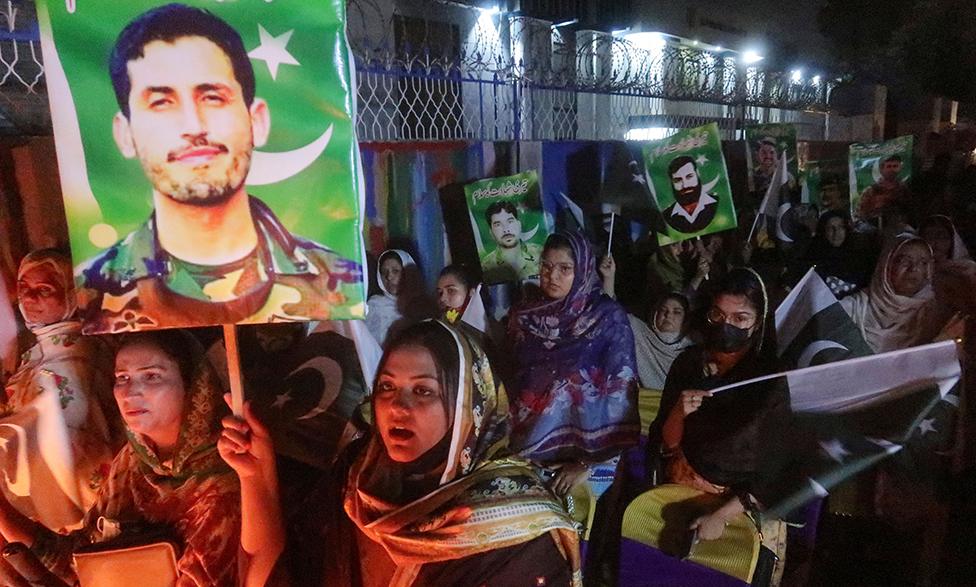
People attend a candlelight vigil in Quetta on "Pakistan Martyrs Day" on Thursday
Pakistan's army is also looking within its own ranks for Khan sympathisers.
One woman that law enforcement agencies were pursuing for her alleged involvement in the 9 May riots is the fashion designer turned political activist Khadija Shah - who is also the granddaughter of a former army chief and a third-generation cantonment child.
She denies committing any crime, but it is clear Khan has mesmerised some of the "army brats" to such an extent that they are willing to set their own house on fire. By arresting Shah and putting her behind bars, the army has sent a clear signal to army families to stay away from Khan's politics.
The army has also tried to dismantle Khan's PTI party through mass arrests and by deciding to hold military trials of workers and leaders who were involved in cantonment attacks.
Many of Khan's senior party leaders are under immense pressure to leave his PTI party. Some have left, claiming that they can't condone Khan's confrontational approach towards the Pakistan army.
Historically, Pakistan's army has always managed to have its way when confronted with civilians. Imran Khan has asked his workers to choose death over a life of slavery. In this deadlock, it's the ordinary Pakistanis who have suffered - and continue to suffer.
British-Pakistani author and journalist Mohammed Hanif is the former head of the BBC's Urdu service, and the author of several plays and novels, including the award-winning A Case of Exploding Mangoes and Our Lady of Alice Bhatti.
Related topics
- Published12 May 2023
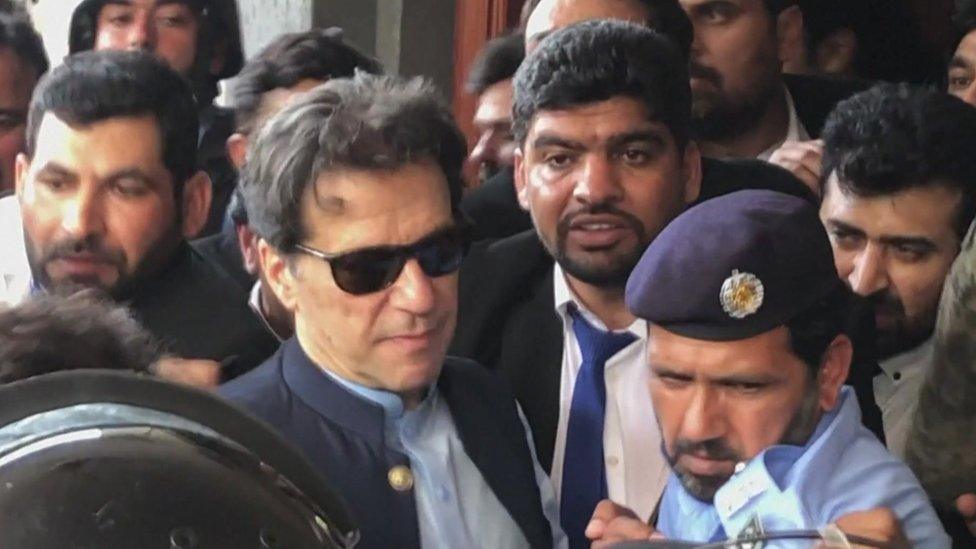
- Published11 May 2023
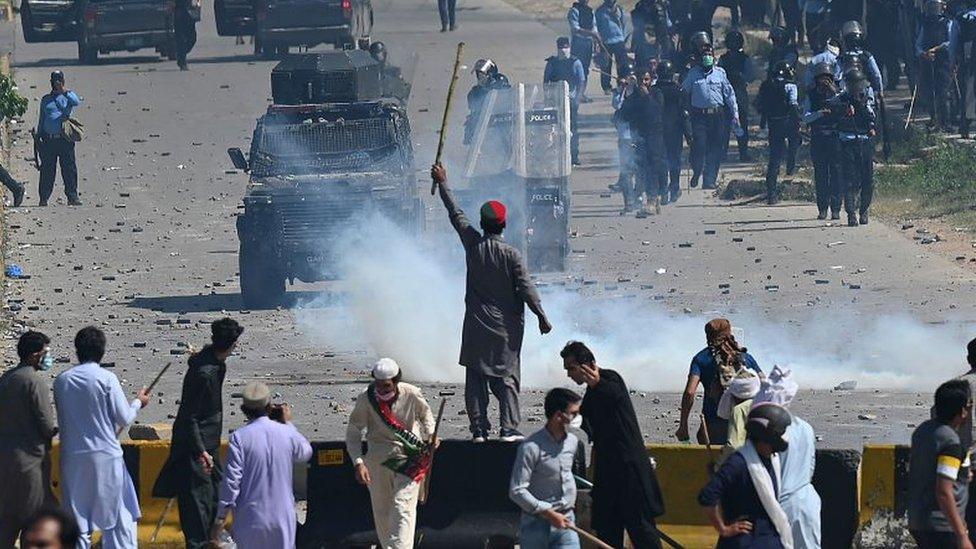
- Published1 February 2024
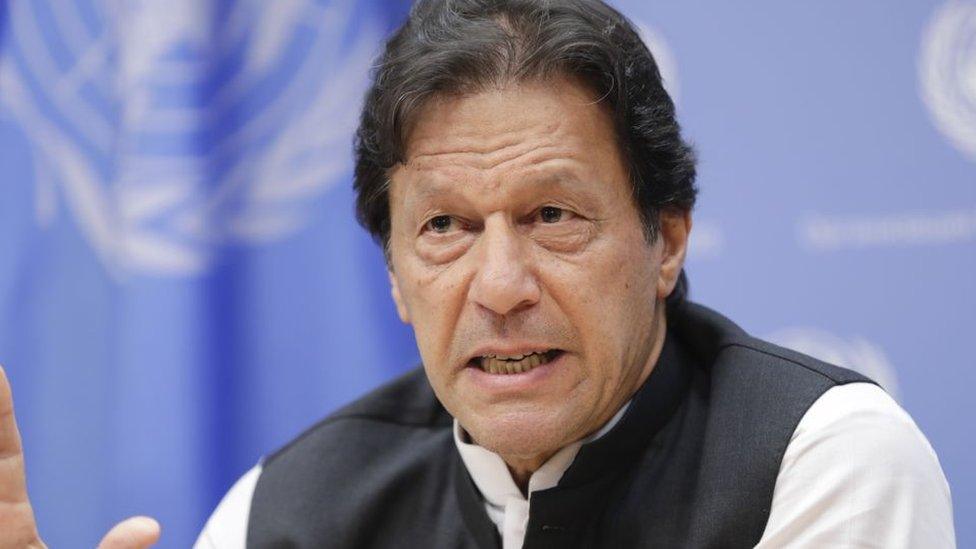
- Published5 May 2023
